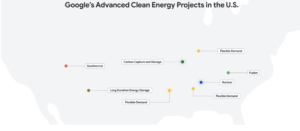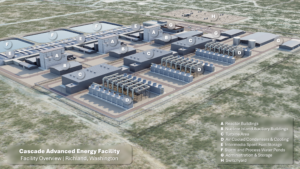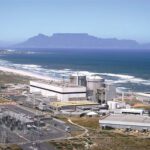Jordan Picks Russian-Built AES-92 For First Reactor. Jordan in early November chose Rosatom’s reactor export subsidiary AtomStroyExport to supply AES-92 nuclear technology for its first nuclear power plant. Rosatom Overseas will be strategic partner and operator of the plant. The plant’s financing has yet to be finalized, but an official of the Jordan Atomic Energy Commission (JAEC) told local media that Russia could contribute at least 49% of the project’s $10 billion cost with the remainder from the Jordanian government. The first reactor of the two-unit plant could begin operating in 2020. The JAEC had narrowed down possible vendors for the plant to an Areva-Mitubishi Heavy Industries consortium for the ATMEA 1 and Russia’s AtomStroyExport for the AES-92 or VVER-1000.
RWE Shelves 1.2-GW Atlantic Array Project. RWE on Nov. 26 halted development of the 1.2-GW Atlantic Array, one of the UK’s largest offshore wind farms, citing technical challenges that made the project “uneconomic.” The facility planned in southwestern England would have featured 240 wind turbines, but it had faced fierce opposition from environmental and heritage groups, which said the 722-foot-high turbines could cause lasting damage. RWE Innogy said technical challenges within the Bristol Channel Zone are “significant,” pointing to substantially deep waters and adverse seabed conditions. “Costs to overcome such technical challenges are prohibitive in current market conditions,” it added. RWE also said, however, that it will continue building the 576-MW Gwynt-Y-Mor offshore wind farm in the UK, a project that is slated for completion in 2014. Renewables made up 15.5% of the UK’s total generation portfolio in mid-2013. The government wants to meet 30% of its electricity needs with renewable power by 2020.
Italy Looks to Sell Eni Stake. Italy’s government on Nov. 21 approved plans to sell up to €12 billion ($16.13 billion) in assets, including a 3% stake worth €2 billion in energy giant Eni, in an effort to ease austerity measures and cut its national debt. The electricity sector in Italy was nationalized in 1962 with the creation of the state-controlled generation, transmission, and distribution company ENEL. In 1999, the sector was liberalized with the Bersani decree. In 1995, the Italian government sold a 63% share of Eni earning €21 billion. The Treasury and the public Cassa Depositi e Prestiti own a 30.1% stake in Eni, which is a power generator in addition to engaging in a number of oil and gas operations. Eni’s installed power generation capacity was 5.3 GW at the end of 2012, which represents a fraction of the country’s total installed capacity of about 118 GW.
Malaysia to Increase Electricity Tariffs by 15% in 2014. Electricity charges in peninsular Malaysia will increase by 14.89% on average in 2014 as part of “subsidy rationalization” measures outlined in the country’s annual budget, the country’s energy minister, Maximus Ongkili, said on Dec. 2. Prime Minister Najib Razak’s budget announced in October targeted cuts of 15.6% in the government’s total subsidy bill in 2014. It also calls for a new consumption tax that could be enacted in 2015. The tariff hike is expected to save the government $1.25 billion in subsidies next year, even though 71% of consumers in peninsular Malaysia would be affected by the increase due to exemptions for low-income Malaysians.
Vietnam Implements New Electricity Law. Vietnam in late October issued a decree implementing the “Law on Electricity,” which essentially provides a master plan for investment in electricity development, power purchases and sales, power prices, power operating licenses, and state administration of power activities and power use. Under the decree, the country’s master plan on power development will be amended every five years or in shorter cycles. The Ministry of Industry and Trade (MoIT) will carry out the preparation and approval of a proposal and cost estimate to amend the national master plan. MoIT will also administer the master plan and guide preparation of an annual plan on investment in electricity development. Among its key attributes, the decree requires investors in generation projects to provide adequate funding for site clearance, compensation payment, and relocation and resettlement assistance. It replaces Government Decree 105/2005/ND-CP (17 August 2005). For more on Vietnam’s power sector, see “Vietnam Works Hard to Power Economic Growth” in POWER’s March 2012 issue at powermag.com.
India’s NHPC to Commission Delayed Hydro Projects by 2018. India’s largest hydro power producer NHPC expects to commission five projects of more than 3,800 MW that have been mired in environmental or contractual gridlock by 2018. The projects include the 2-GW Subansiri Lower project in Assam, which was expected to be commissioned by December 2012 but will now likely come online by December 2017. The controversial project’s costs have doubled since 2002 to an estimated $1.9 billion because it has been held up by issues about the dam’s safety and downstream impact, NHPC said. The 520-MW Parbati-III project in Himachal Pradesh, which was stalled due to contractual issues, will now be commissioned in March 2014—a delay of more than three years. The 800-MW Parbati-II, which should have been commissioned this March, is now scheduled for commissioning in March 2018. The 160-MW Teesta Low Dam Project-IV in West Bengal and the 330-MW Kishanganga in Jammu & Kashmir are to be completed by November 2014 and November 2016, respectively.
Brazil Could See $8B Grid Boost. Brazil’s energy research agency Empresa de Pesquisa Energética (EPE) predicts that the country will need to spend up to $7.8 billion to build more than 13,000 kilometers of new transmission lines and 39 substations by 2018 to ensure grid reliability. The Transmission Expansion Program announced on Nov. 26 will be open for bidding in 2014. The country is looking to mitigate delays affecting expansions to the National Interconnected System. The projects outlined by the EPE refer to projects whose feasibility studies have been completed but not yet bid. ■
—Sonal Patel is a POWER associate editor (@POWERmagazine, @sonalcpatel).









